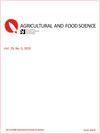企业社会责任与消费者选择:抵制牛奶事件的教训
IF 1.1
4区 农林科学
Q3 AGRICULTURE, MULTIDISCIPLINARY
引用次数: 1
摘要
我们研究了对韩国最大的乳制品生产商之一的抵制的影响,该抵制是由该公司不道德的管理行为的曝光引发的,对其产品销售和价格的影响。我们发现经验证据表明,抵制运动产生了重大而持久的后果。首先,抵制产品的消费者效用显著下降,反映出消费者参与集体行动的意愿较强。此外,收入较低或家庭规模较大的消费者更积极地参与抵制活动。其次,我们的离散选择需求模型解决了抵制和价格内质性的异质效应,估计在抵制后的10个月里,两种抵制产品的总销量减少了790万升,而非抵制产品的竞争销量同期增加了300万升。第三,被抵制公司大幅降价的产品的销售和收入下降不那么严重;我们的反事实分析预测,如果没有降价,该公司在抵制后的收入损失将高出75.8%。我们的研究结果强调了高层管理者在公司内部培养道德组织文化以及采取适当和及时的对策来遏制抵制所造成的损失方面的作用。本文章由计算机程序翻译,如有差异,请以英文原文为准。
Corporate Social Responsibility and Consumer Choice: Lessons from the Milk Boycott
We study the impact of a boycott on one of the largest Korean dairy producers, triggered by the exposure of the firm's unethical management practices, on its product sales and prices. We find empirical evidence that the boycott had substantial and long lasting consequences. First, consumer utility from the boycotted products decreased significantly, reflecting consumers' strong willingness to take part in the collective action. In addition, consumers with lower income or larger family size participated in the boycott more actively. Second, our discrete choice demand model, which addresses both heterogenous effects of the boycott and price endogeneity, estimates that sales of the two boycotted products decreased by 7.9 million liters in total during the 10-month post-boycott period, whereas sales of competing non-boycotted products increased by 3 million liters in the same period. Third, the decrease in sales and revenue was less severe for the product for which the boycotted firm sharply cut the price; our counterfactual analysis predicts that the firm's post-boycott revenue loss would have been higher by 75.8 percent had the price cut not been made. Our findings emphasize top-level managers' role in fostering an ethical organizational culture within the firm as well as taking proper and timely countermeasures to curb losses incurred by a boycott.
求助全文
通过发布文献求助,成功后即可免费获取论文全文。
去求助
来源期刊

Agricultural and Food Science
农林科学-农业综合
CiteScore
2.50
自引率
0.00%
发文量
22
审稿时长
>36 weeks
期刊介绍:
Agricultural and Food Science (AFSci) publishes original research reports on agriculture and food research related to primary production and which have a northern dimension. The fields within the scope of the journal include agricultural economics, agricultural engineering, animal science, environmental science, horticulture, plant and soil science and primary production-related food science. Papers covering both basic and applied research are welcome.
AFSci is published by the Scientific Agricultural Society of Finland. AFSci, former The Journal of the Scientific Agricultural Society of Finland, has been published regularly since 1928. Alongside the printed version, online publishing began in 2000. Since the year 2010 Agricultural and Food Science has only been available online as an Open Access journal, provided to the user free of charge. Full texts are available online from 1945 on.
 求助内容:
求助内容: 应助结果提醒方式:
应助结果提醒方式:


